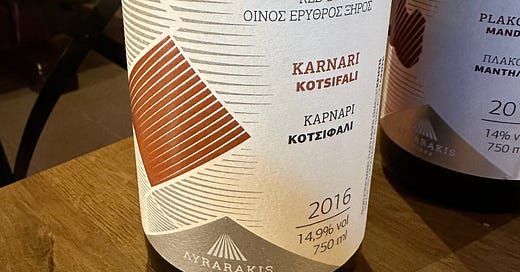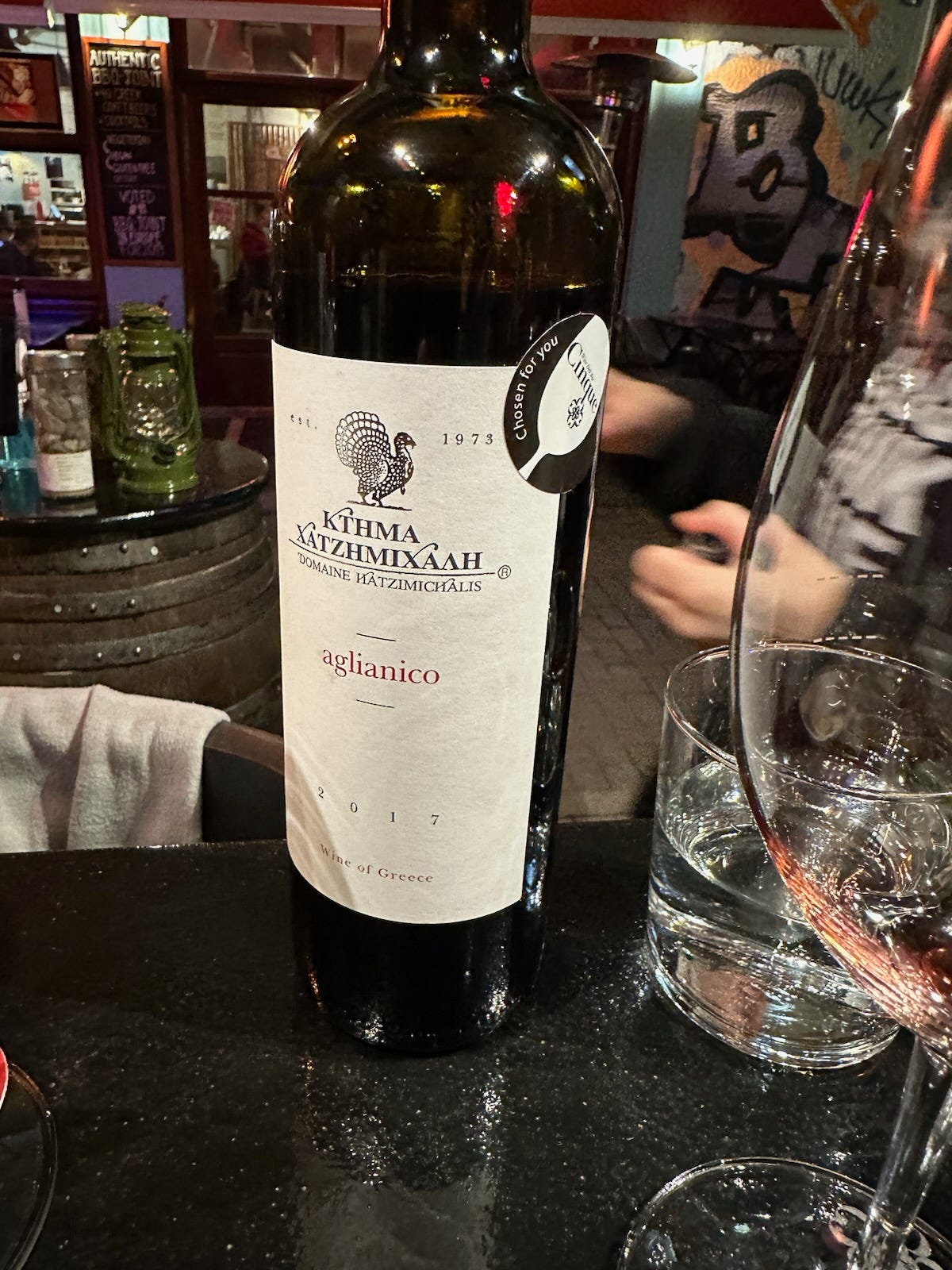Today I was asked to recommend a wine for a customer’s dinner party. As we talked a bit about what he planned to serve, what came to mind for me was an Assyrtiko: bright, crisp, acidic, with good minerality and a little salinity. But when he realized I was headed for the Greek section, he stopped short. “I’m cooking a pretty upscale menu; I don’t think Greek wine is going to be refined enough.” I’m not sure his plans for some fish and a Greek salad warranted looking down his nose at an entire country’s wine culture regardless of the country, but he was expressing a common perception of Greek wines - and one that I shared until recently. Like him, I thought of Greek wines as rustic, and not in a good way. Simple. Unrefined. I formed an opinion of all of Greek wine based on a couple of mediocre Assyrtikos and one truly terrible Retsina.
However, I traveled to Greece in January and had the opportunity to taste a wide range of their wines. Let me tell you, Greek wine has been radically underestimated. Even Assyrtiko itself, which is the only Greek wine many Americans have experienced, varies greatly by region and producer. And Retsina! Okay, sometimes it is terrible. It’s like white wine and gin had a baby: a rather Targaryen baby, and the universe flips a coin to decide whether it will be brilliant or horrific. I had a couple of brilliant ones - the best being an aged Pine Forest from Gikas. The pine resin is added only briefly, and I thought it gave the wine a pleasantly refreshing, aromatic finish.
I was surprised across the spectrum, both by global varietals I didn’t expect to see (or enjoy) in Greece, and by native grapes that were completely new to me. The Syrahs were excellent, especially on Crete: rich and black fruit-forward but subtly savory and peppery, like good Syrah should be. I had one of the best Cabernet Sauvignons I’ve ever tasted at Cinque Wine Bar in Athens. It might have been this one. Unfortunately I was enjoying myself too much that evening and forgot to take a picture or make notes. We’ll come back to Cinque, which is worth a note on its own and definitely a visit if you’re ever in Athens.
The native varietals were both more varied and more enjoyable than I expected. I was particularly drawn to the Kotsifali, which is light bodied but intense in flavors of tart cherry, cranberry, and white pepper. In western Crete the tradition is to make these in softer styles using oxidation during vinification and long aging in old barrels.
I loved this one from Lyrarakis Wines - and really, most of their wines, which I got to sample in the vineyard. I was also impressed by their 2015 Aggelis Liatiko which we enjoyed with dinner at Peskesi; if you ever get to Crete, this restaurant should be at the top of your list. It’s in my top 5 restaurant meals ever, easily. My visit was heavy on the Cretan wines, but a variety native to the mainland is Agiorgitiko, often used to make Nemea. There may be bad Nemea, but I have yet to experience one.
Aglianico is usually seen as an Italian grape, but the name is derived from a word meaning “the Greek,” and Aglianico seems to have originated in Greece. Evangeline Prassas at Cinque (yes, we’re back to that) has an uncanny way of pegging people’s wine tastes, and she correctly discerned that I would love this one, and probably drink too much of it at her lovely wine bar.
Cinque is everything I want a wine bar to be: cozy, hospitable, with the easy ability to access nerdy wine details if you’re the kind of person who wants them. They are specifically a Greek-focused business, paying homage to the great wines, cheeses, charcuterie, and produce of the regions of Greece. They specialize in flights that introduce you to a particular region, grape, or style, and come with a video from sommelier Nikitas Prassas (Evangeline’s son) describing the terroir and characteristics of each wine as he tastes it along with you. Our visits (yes, plural) were such an amazing way to get acquainted with the wines of the entire country, even while our travel was limited to Athens and Crete.
I will say that I was a bit concerned that I was being tricked by “vineyard magic,” that phenomenon in which wine tastes better when you’re experiencing it in the usually beautiful and charming place in which it is made. Somehow between the two of us, we managed to bring twenty-two bottles home in suitcases we bought in Athens and packed with whatever cushioning we could possibly find. There was one casualty. I haven’t opened it all, but so far everything I have opened has survived the test of drinking it in my far less beautiful and charming kitchen. So if you get the opportunity to travel to Greece, do not fear the wines! And if your local store has a decent selection that goes beyond a couple of dusty bottles of Assyrtiko turning golden on the shelf, consider picking up a bottle and trying it out.
When you do, you can raise your glass and say with gusto, “Yamas!” the traditional cheers which simply means, “To our health!”
In personal news, I’ve officially left my previous job and am full-time in the wine industry, working in retail sales and building my own business doing wine tastings, education, and writing. If you’d like to support my journey, please share my posts, become a free or paid subscriber to this newsletter, and visit my website for upcoming opportunities or to book a tasting! Thanks for hanging in there as I’ve made this transition in fits and starts over the last few months.






